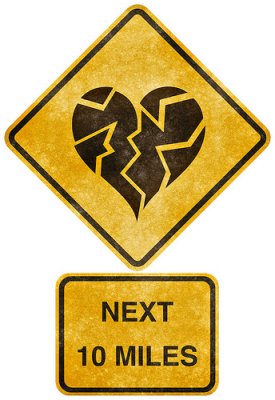“Should I End My Relationship?” How to Know If It’s Time

By: Neal Fowler
by Andrea M. Darcy
Ask your friends, “should I end my relationship?”, and they’ll likely all have a strong viewpoint.
But they are not you. Despite wanting the best for you, they are not living out your life and only see a part of it.
A counsellor or psychotherapist, however, is impartial.
So then what are the sort of questions a therapist might ask if you want to know ‘should I end my relationship’?
10 good questions to ask if you are considering ending a relationship
1. What other stress is going on in your life right now?
Relationships are the easiest scape goat if there is something going on in life we don’t want to face. This might be impending redundancy, a health issue, children leaving the nest, or an old trauma surfacing after a trigger.
2. What is the real issue (or issues) between you?
‘We just aren’t getting along’ is vague, and ‘the spark is gone’ is a coverup for deeper issues.
Try some deep journalling. Keep asking yourself good how/what questions. A good one is, ‘and what is behind that?’.
For example, ‘she always nags me’ and what is behind that, ‘it annoys me’ and what is behind that, ‘it makes me feel not good enough’ and what is behind that, ‘I often feel she only married me as her ex left her’. And then, ‘should I end my relationship over this? ‘No, sounds like something I can work on’.
3. Is the trust intact between you, even if it’s just a tiny spark?
Issues, no matter how large, can be worked on if the trust is still intact. Some couples find trust even after things like betrayal. They find all sorts of little ways they still trust their partner and grow it from there.
But if you honestly don’t feel you can ever trust your partner again? It might be time to go.
[Truth is you are not really sure what a healthy relationship is or isn’t? Don’t panic, read our in-depth and free Guide to Relationships.]
4. Is this at all a pattern in your life?

By: Nicolas Raymond
If you always lose attraction at the six month mark, or always go cold once marriage comes up, there is something to be said for getting support to try and work it out. You’ll likely just create the exact same experience yet again in the next relationship anyway.
5. What was the beginning like?
Once we physically engage with someone, our bodies release chemicals that affect our clear-headedness. Once that wears off, the familiar can become what lulls us.
But the truth can be found in the beginning. Did you have any funny feelings or instincts you overrode? Or see something you felt you couldn’t live with, but rushed in to a relationship anyway? Or did you genuinely think he or she was the right one for you?
6. From where you are now standing, how much was withheld from you?
If a partner hides a lot then slowly leaks out big truths, it can feel confusing. But going to that beginning again, how much was withheld?
Did he or she hide big things, such as a child, parents that were moving in, being married, terrible debt, or a criminal offence that limits your future options?
If you knew then what you know now, would you honestly have gotten involved?
7. What are your personal values? And do you share these with your partner?
If there is one thing you will constantly find in healthy long-term relationships, it will be shared values. This is why couples who seem on the surface a mismatch can last. Whether it’s a love of helping others, a love of adventure, or a belief in family, they share personal values.
Mismatched values are often the real reason why someone ‘gets on our nerves’ or ‘drives us crazy’. Their little habits run counter to our deeply-held values. Their being late for everything grates at your value of respecting others, their refusal to apply for a promotion is directly against your value of ambition, and their uncertainty around kids denigrates your value of family. Contrasting values rarely a good relationship makes.
8. Are you growing in the same direction?
The point of relationships is to grow together. But if one partner doesn’t want to, or you take vastly different directions, it can signal the end.
If one partner, for example, is suddenly taken by personal development but the other doesn’t want to change, or one partner wants to start volunteering and the other becomes obsessed with fame, eventually the divide signals the end.
9. Are you still on the same page after a life change?
One of the ways we can end up growing in different directions is when a life change happens to one partner.
For example, losing a parent can leave one person on a sudden spiritual path, leaving their atheist partner confounded and no longer able to connect.
It can be deeply painful when something beyond your control has changed your shared life. But we can only honestly choose the future we know we are actually capable of living.
10. Are you able to be yourself?
This is the key sign you are in a working, authentic relationship. If not, if you have changed so much in the relationship you don’t know who you are anymore, or you feel like you are always acting, or are on eggshells all the time trying to please? Then something is wrong.
It could be codependency. But it could also be that you are being controlled or even emotionally abused, which means it’s a relationship you’d be best out of.
11. Was there sexual attraction?
Notice it says was, not is. Sexual attraction can come and go. In fact it inevitably does with enough time.
But if you are in a relationship where there never was attraction, and you were hoping it would grow but keep struggling with it?
It might be time to admit you are in a friendship.
12. Is there any form of abuse going on?
Not all forms of abuse are obvious. Emotional abuse can always be behind doors until you feel it’s ‘all in your head’. Financial abuse can be so difficult to face and talk about you can deny it even to yourself.
But abuse is abuse and it’s a red flag to get all and any support you can to find your way out. Be very wary of accusing your abuser, which can put your health at risk or leave you more manipulated and stuck. If you don’t know who to turn to, consider calling a helpline.
So what is it – stay or go?
With the right support, issues we think might devastate a relationship can and often are overcome by couples. This can include things like betrayal, lying, boredom, and sudden lack of sexual attraction.
Couples counselling is highly recommended here. The counsellor does not tell you what to do, he or she simply helps you both communicate and seek solutions.
What tends to make an ending more likely is if you don’t share values or a vision for the future, you’ve rushed in and/or built a relationship on illusions, or you are simply are not going to grow in the same direction any further.
If it’s abuse you are dealing with, regardless if you are the abused or the abuser, do reach out for support. Abuse tends to be an addictive pattern. Unless we admit we are powerless in our efforts to stop accepting abuse or abusing others, the pattern tends to continue. Support can help you finally end the cycle and find the strength to make better choices.
Want to speak to a therapist about your relationship? Harley Therapy connects you with some of the best couples counsellors in London. Or try our new platform, connecting you with therapists right across the UK via Online therapy.
Still have a question about ‘should I end my relationship?’ Or have something you want to share with other readers? Use the public comment box below.

Andrea M. Darcy is a mental health and wellbeing expert and personal development teacher with training in person-centred counselling and coaching, as well as a popular psychology writer. Follow her on Instagram for useful life tips @am_darcy







You’ll know it’s time to end the relationship when there isn’t any spark, sexual chemistry is on an all-time low, you aren’t getting on and you don’t look forward to seeing the person anymore.
I had something similar with an ex of mine, it was great for about the first year, but then afterwards it was horrible. He changed a lot and he got really nasty, I was terrified to go round his house when I should be looking forward to seeing him!
Thank you for posting, this really helped, and I hope it helps other people too xx
Hi Kirsty, thanks for sharing. We’d just say though that losing your ‘spark’ and low chemistry are not really reasons to believe a relationship is over, unless you rushed heedlessly into a relationship based solely on attraction and now discover you and the other person don’t really know each other or like each other. In that case, perhaps the focus should be on where your ideas of relationships come from. Movies and films? Real love is not like that. It requires a firm base of getting to know someone, accepting them for their flaws, and truly connecting via healthy connection. All relationships have times when the sexual chemistry falters. It can be life stress, for example, that does it. Good relationships make it through and are not based solely on sex.
Great article – I was in a similar position to Kirsty, it felt like all the love had gone out of our relationship, but we did work at it (with the help of a counsellor) and now we’re really happy again.
I can see it from both sides, sometimes people stay in a relationship, trying and failing to make it work – but I do think it is always worth trying!